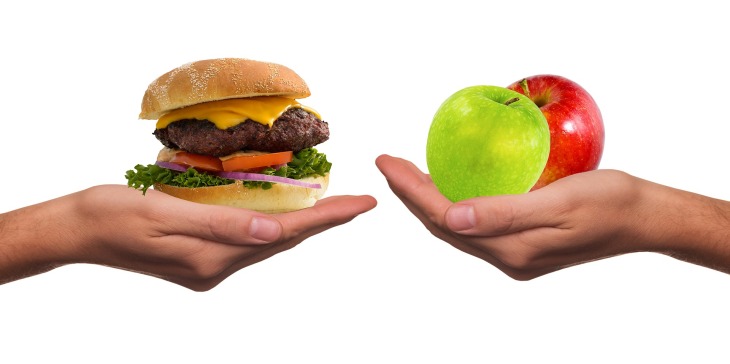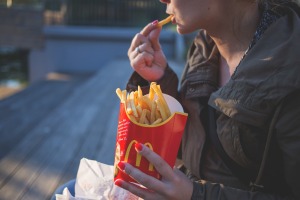Intermittent fasting
Fasting literally means not eating, and sometimes not even drinking. Long durations of fasting may be good for the health but in today’s lifestyle it may not be very practical to follow it and can be easily replaced by intermittent fasting or intermittent energy restriction to reap equal benefits of fasting. So what is intermittent fasting?
Well, it is time-restricted feeding, meaning not eating every day for some hours or every alternate day thereby reducing the frequency of meal intake. Notice that I said frequency of meals, not quantity. Many people mistakenly think that eating less portion sizes is good for the health. Well, while eating, if you are still hungry and stop before your hunger is quenched, it may not be such a great idea as it creates more resistance internally and what we resist persists.
Many doctors and health coaches have previously recommended that eating short frequent meals throughout the day is good for the health; however, that is not such a great idea anymore for several reasons. Think about it. Will the food industry profit from you skipping breakfast? Think of all the breakfast fads out there in the market making money at the cost of your health; most muesli and cornflake products are loaded with sugar or gluten which negate the health benefits of the other ingredients in them. Not only that, even the billion-dollar pharmaceutical industry loses money as you become healthier you depend less on drugs. If people do intermittent fasting, exercise regularly and they are healthy, how will those industries make money? Will they make money from healthy people? 3 meals + in-between snacks only improve the food industry’s revenue, not your health!
Secondly, when you eat several meals throughout the day your digestive system is constantly at work without any break! During eating a lot of metabolic processes are kicked in, to deal with the food: digestion, absorption, excretion etc. Think of the body as a machine and like any machine has a battery, there is a finite ability of the battery to be effective. When a machine is overused, it is bound to give up on you sooner than later. The organs inside our body are machines working for us all the time. Every time you put food into the body, your digestive system starts working as your liver starts secreting bile, your kidneys start filtering the debris, your pancreas, gall bladder, intestines etc. get into action and over time, when these systems are working overtime (pun intended) there are more chances of diseases occurring. Rather when you create a gap in between your food intake, it actually impels the body and the brain to stay alert longer, boost brain function and secrete antioxidants that keep you younger looking, glowing skin, healthy and yes, reduce the risk of cancer! Hence, it is nice to give certain organs of the body rest at times.
 Thirdly, you actually feel sluggish and without much energy by eating frequently throughout the day, perpetually hungry as the digestive juices are working all the time. Whereas, if you can fast a few hours more than the regular eating hours, you will actually feel more energetic and you can even exercise to speed up the health benefits of fasting. Restricting the time window of feeding to approximately 8 hours a day will have more health benefits, meaning eating within 8 hours and fasting the rest 16 hours, as it is long enough to shift the energy metabolism in the body.
Thirdly, you actually feel sluggish and without much energy by eating frequently throughout the day, perpetually hungry as the digestive juices are working all the time. Whereas, if you can fast a few hours more than the regular eating hours, you will actually feel more energetic and you can even exercise to speed up the health benefits of fasting. Restricting the time window of feeding to approximately 8 hours a day will have more health benefits, meaning eating within 8 hours and fasting the rest 16 hours, as it is long enough to shift the energy metabolism in the body.
How to fast?
It is recommended to keep a fast of at least 12-16 hours every day or every alternate day. Or you can do a 24 hour fast once/twice a week and eat normally the remaining days. The most convenient time to fast is perhaps at nights, when your body can naturally go to sleep and you can get your 16 hours of no food as you skip breakfast in the morning. Yes, you heard it right. Skip breakfast and eat brunch or go directly to dinner if you are pro at this! But whether you have two or one meal per day, make sure your feeding window is within a 5-8 hour period. Meaning, if you eat lunch say at 2pm and dinner at 8pm, so then after dinner your body will get a 16 hour break until lunch the next day. Also avoid snacking or munching and when you do eat your meals, try to get a balanced diet so your body can get the nutrients it needs. Avoid binging on junk food at the end of a fast.

Men vs women: for women fasting works slightly different from men due to different hormones. While men can go long hours without eating anything, it is good for women to have something really small during the fasting hours, like some form of fat but not fiber because with fiber the digestive system has to do double work. So eat a slice of cheese or a fruit. I wouldn’t recommend dry fast i.e. going without water etc. Do a wet fast with electrolytes, get sodium, magnesium, calcium and drink enough water.
Fasting aids in cellular detox, caloric restriction, lowers rates of cancer, helps longer telomeres which is the marker for ageing, improves systemic information, reduces oxidation and blood sugar damage in the body, enhances metabolic health, keeps off diseases in general, maintains good health, boosts brain function, keeps the mind young and agile, gives your digestive system a break from time to time and your body will thank you for it! Limiting feeding opportunities reduces the amount of calories you intake as your appetite hormones decrease, so you eat less. With 12-14 hour fasting, you can surely achieve weight loss, however, if you wish to reap the more profound benefits of fasting, try at least 16 hours or more. Because cellular detoxification kicks in with 16, 18, 24 hours, so perhaps once or twice a week you can do a 24-hour fast. So here are the different feeding windows, from beginners to advanced level, with the first number representing the number of hours of fasting and the second representing the number of hours of feeding:
- 12 : 12
- 16 : 8
- 20 : 4
- 24 : 0
You can also try alternate day fasting where you eat till satisfaction on the feast day and the next day eat <600 calories; or periodic fasting where 5 days you eat normally and 2 days you eat <600 calories. You can do a variation of these. Be flexible. This is voluntary fasting not starving, so you are in control here.
If you are used to eating short meals throughout the day, or snacking in between meals, this may be hard to imbibe initially. But practice creates habit. Start small, one step at a time and gradually you will get used to it as you adapt to the habit. Then you will find when you don’t eat so much you’re actually more productive. At the beginning you may also find it difficult to fall asleep at nights or feel drained of energy as your body needs time to adjust to the new habit but within a week or two of practicing this, you will actually start to feel more energy in your body, more alert and less hungry. Your body will signal to you when it is hungry and that’s when you should eat.
Some people even fast for a whole week or more continuously sometimes due to religious reasons; this may be healthy but harder to follow. Nevertheless, if you want to do it, you can do it twice a year or once a quarter. Ideally dinner to dinner is easier to maintain. You can also do breakfast to breakfast or lunch to lunch, but socially it is difficult to fast during the day than at nights. However, by all means eat during the day if you’re more comfortable with it. You can break fast anytime or skip fasting; find your own rhythm.
Weight loss
One thing that happens while fasting, that does not happen when you eat 3 meals a day is that your energy metabolism shifts so you start burning fat. Intermittent fasting is very effective for weight loss and metabolic health as this method of fasting restricts calories. When you eat anything, the energy goes into the liver and is stored as glycogen and it takes about 12 hours to deplete the glycogen stores in the liver. So if you keep eating, you will never exhaust the glycogen although it can be exhausted through exercise. But once you deplete the glycogen stores, you start burning fat and you produce ketone bodies. Ketone bodies are also very good for the brain. Higher ketone levels can even prevent brain damage caused due to contact sports like football etc. You see, fasting is therapeutic.
People try all sorts of ways to lose weight, gymming, swimming, vigorous exercising, rigorous dieting etc. but the healthiest and perhaps one of the easiest ways to lose the excess flab is through intermittent fasting. The results are fast and the health benefits are huge! Just try it for a month and see the results for yourself!
Wet fast vs dry fast: as it suggests, wet fast is drinking water or electrolytes during a fast and dry fast is going even without water. I would not particularly recommend dry fast as our body needs minerals. So drinking water during a fast is a great way to cleanse the body. You can also drink tea, hot salt water, bone broth or drinks with electrolytes etc.
 Fasting vs dieting: fasting is not the same as dieting. Fasting is the absence of eating while dieting is eating less or specific food in order to lose weight, gain muscles etc. And dieting is a form of starving where your body keeps wanting more and you deny it, so often it is counterproductive. You cannot stick with it for long and when you stop you gain the weight back, because it is a form of resistance to what is. Whereas fasting is just giving a bigger gap in between meals and when you do eat, eat until your hunger is quenched with a balanced diet. I don’t recommend junk food or just any food, but you don’t need to consciously check your calories all the time! In fact, it is recommended for women to even munch some kind of fat during the intermittent fasting period so their hormones don’t go bonkers!
Fasting vs dieting: fasting is not the same as dieting. Fasting is the absence of eating while dieting is eating less or specific food in order to lose weight, gain muscles etc. And dieting is a form of starving where your body keeps wanting more and you deny it, so often it is counterproductive. You cannot stick with it for long and when you stop you gain the weight back, because it is a form of resistance to what is. Whereas fasting is just giving a bigger gap in between meals and when you do eat, eat until your hunger is quenched with a balanced diet. I don’t recommend junk food or just any food, but you don’t need to consciously check your calories all the time! In fact, it is recommended for women to even munch some kind of fat during the intermittent fasting period so their hormones don’t go bonkers!
Experience the magic, the cognitive clarity that doesn’t come with dieting but only with fasting. Fasting is more powerful at increasing ketones than ketogenic diet for example. However don’t starve yourself. Because the feeling of starvation is that of lack and you are more at resistance to what is, hence any efforts at change will be harder. This is fasting out of will, not forced. You fast for a while then you EAT!
So, happy fasting! Enjoy your good health and do let me know in the comments section below how intermittent fasting has helped you… salud!
Fasting is also an excellent way to augment brain capacity. Watch this video to learn more about it, and subscribe to magicNine TV: youtube.com/magicNine for more such videos.

Jahisprojectillogic.home.blog is a magical journey of syncrinicity it’s about a schizophrenics quest and attainment of enlightenment like I said is a magical journey with astounding art and currently a double album you see I wanted to become a master since I was 12 and now I’m 34 and a true master
That book is 125 thousand words long and took over 3 quarters of a year to complete. It started from nothing and ended flawlessly.
My new blog will be my blog for the rest of my life
Infinitepi.home.blog
My name is jerome Allen Hickman aka jah aka jerome the janitor aka local rapper Jerry
I am a legendary manifestation of power aka. Master of the universe lol
LikeLike
My fasting cycle starts after dinner and until lunch time the next day. So if possible, I try to skip breakfast which gives me about 16 hours of fasting. But if I feel very hungry early in the morning (even after drinking plenty of water), then I will skip lunch instead. This gives me about 10 – 12 hours of fasting. The problem with skipping lunch instead of breakfast is that I tend to “compensate” during dinner. Another challenge is having enough water when fasting – I often miss taking at least 8 glasses of water.
LikeLiked by 1 person
That is fine, don’t be too rigid with yourself; just enjoy the process. If someday you feel hungry, eat. If other days you don’t feel the urge, you can fast. There are no hard and fast rules here; as long as you know the benefits of fasting, you can always do it at your own pace. Dry fasting also has its benefits, so drinking water/electrolytes during a fast is optional anyways. If you can do a long stretch that’s good, but if you’re putting a big gap between your meal intakes, that’s also good for your body, whether you skip breakfast or lunch. So keep going, g’luck!
LikeLike
True indeed, there are days when I don’t fast especially when out with the family
LikeLiked by 1 person
you are my intake, I own few blogs and rarely run out from to post : (.
LikeLike
this is the best blog i came across where no one can beat u.
LikeLike
You need to know this information because it could save your life one day…. That’s why this is critical information for anyone…
LikeLike
Thanks for the marvelous posting! I really enjoyed reading it, you might be a great author.I will always bookmark yourblog and will eventually come back someday.I want to encourage yourself to continue your great work, have a nice evening!
LikeLike